According to a new paper, the Earth’s ocean heat content time derivative (OHCTD) has been decreasing (-0.26 W/m²/decade) since 2000, coinciding with a similar deficit in the Earth’s energy imbalance (EEI). The authors acknowledge such trends are “surprising” considering greenhouse gas emissions have risen.
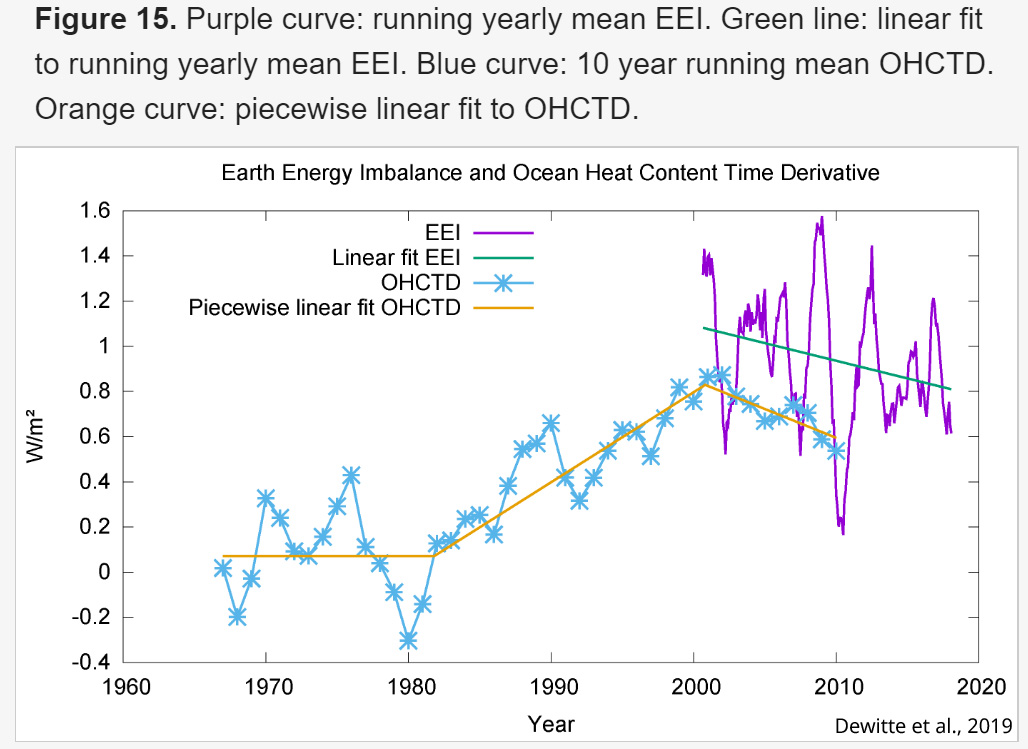
Image Source: Dewitte et al., 2019
Earth’s energy budget imbalanced?
Global warming occurs when there is more energy coming in to the climate system than leaving. This results in a positive imbalance in the Earth’s energy budget.
Most studies claim the imbalance has been about +0.6 W/m² since the 2000s (Stephens et al., 2012, Llovel et al., 2013), although the uncertainty in the surface energy imbalance estimate reaches ±17 W/m² (Stephens et al., 2012). Uncertainty in the Earth’s energy imbalance is therefore more than 100 times larger than the total accumulated forcing for CO2 over a 10-year period (+0.2 W/m², Feldman et al., 2015).
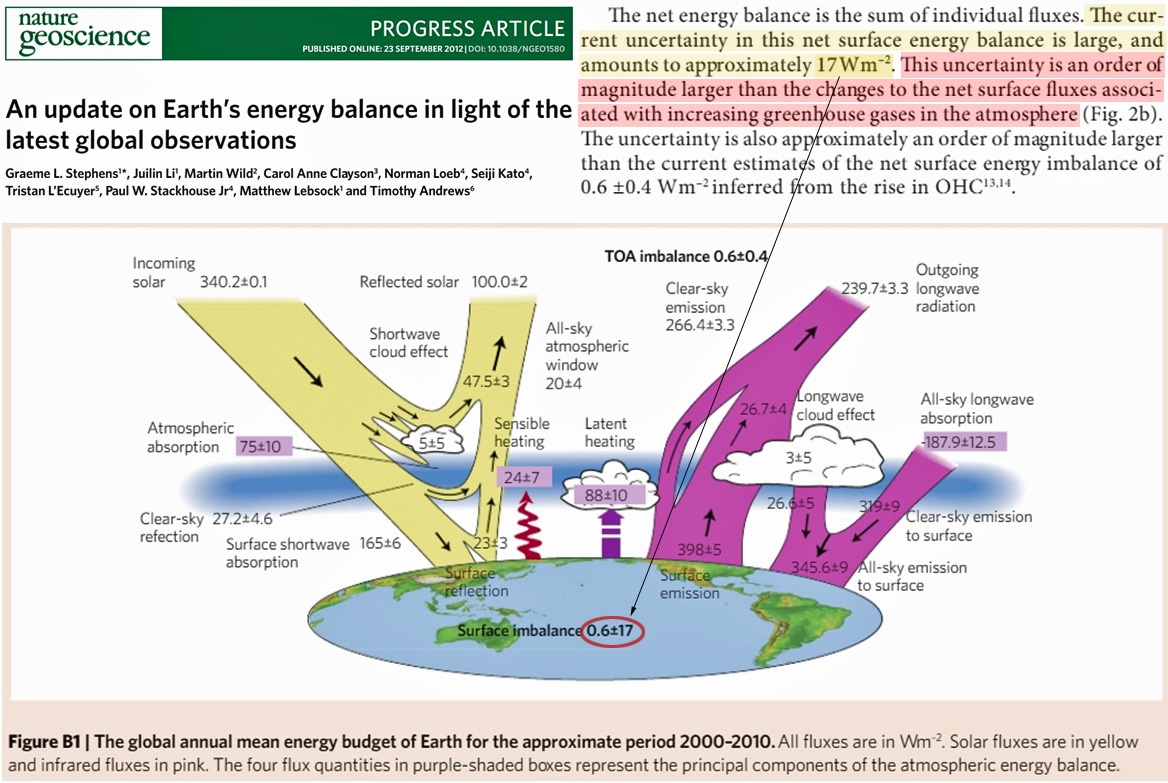
Image Source: Stephens et al., 2012
A cooling global ocean?
Per the IPCC, 93% of “global warming” is manifested by rising trends in 0-2000 m ocean heat content (OHC) (IPCC AR5, Chapter 3).
In 2006 scientists published a paper in Geophysical Research Letters asserting global OHC had rapidly declined from 2003 to 2005.
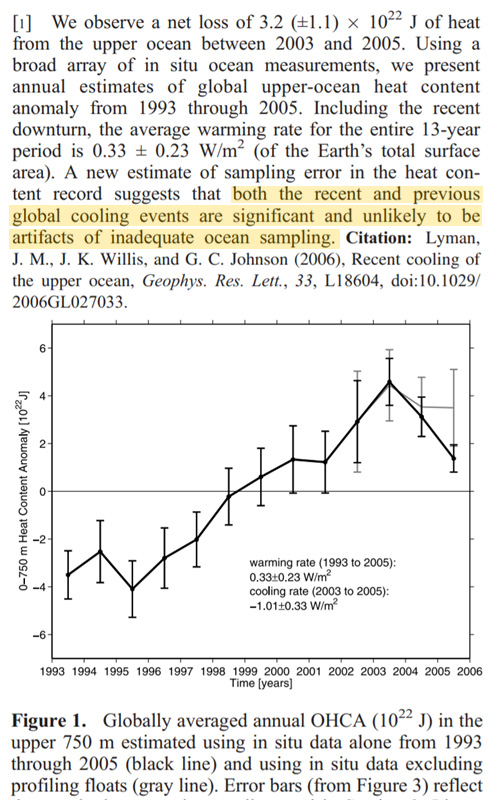
Image Source: Lyman et al., 2006
Cooling must be corrected to show warming
Of course, a cooling ocean does not conform with climate models predicating ocean heat content should rise in tandem with CO2 emissions.
So the overseers of ocean heat content datasets set out to find a way to “correct” the data.
Sure enough, by 2007, NASA’s Josh Willis had discovered two biases that could explain the cooling. The OHC data could now be changed to show warming.
Josh Willis’s correcting-the-cooling feat was even featured in a NASA article blithely titled “Correcting Ocean Cooling” that same year.

Image Source: NASA.gov
Then a few years later, Loehle (2009) also found the global oceans had been cooling at a rate of -0.35 (±0.2) x 10²² Joules per year, but this time the cooling had extended from 2003 to 2008.
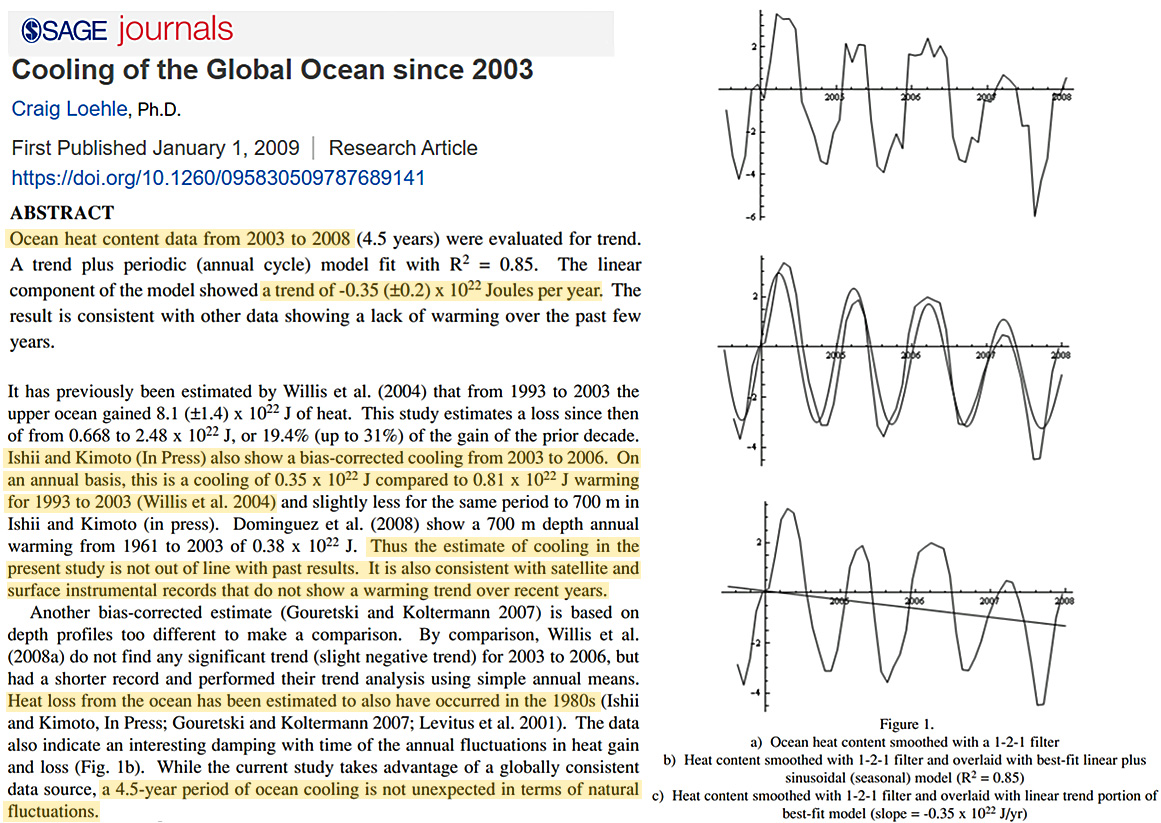
Image Source: Loehle, 2009
With “uncorrected” ocean data assessing a cooling trend from 2003 to 2008, it wasn’t long before the data overseers decided they must remove all the cooling from the record.
So they did.
Today, the period between 2003 and 2008 has been “corrected” to show a stint of rapid warming.
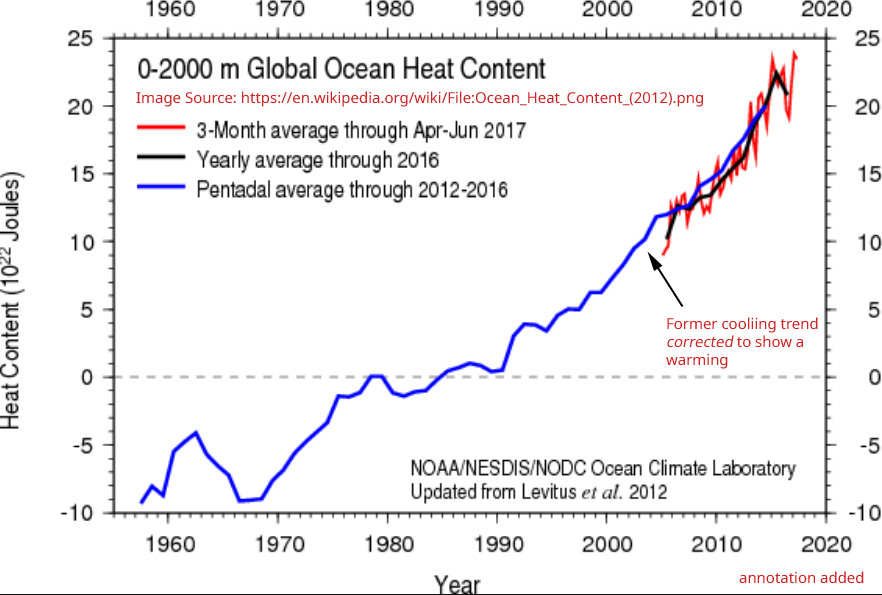
Image Source: Wikipedia
New paper: Earth’s energy imbalance in deficit since 2000
A new data analysis authored by three Belgian scientists (Dewitte et al., 2019) finds not only has there been more heat energy leaving than accumulating in the Earth’s climate system this century, but ocean heat content time derivative (OHCTD) has likewise been declining since the early 2000s.
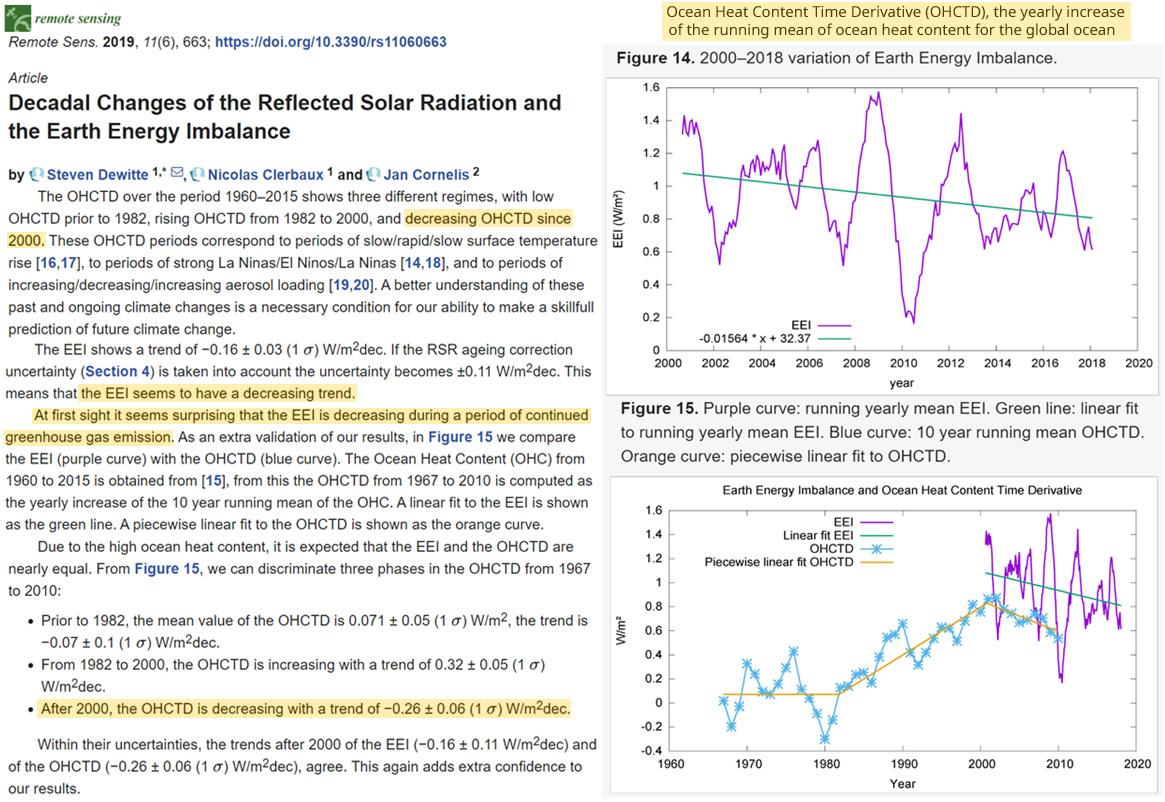
Image Source: Dewitte et al., 2019
The authors assessed the trends in OHCTD during 1960-2015. They found that although there was a rising trend from 1982 to 2000, since 2000 the OHCTD trend has been decreasing at a rate of -0.26 W/m² per decade.
Compatibly, Dewitte and co-authors also determined there has been a declining trend (-0.16 ±0.11 W/m² per decade) in the Earth’s energy imbalance (EEI) from 2000-2018.
The scientists acknowledge that these trends may seem “surprising” at first given the sharp rise in greenhouse gas emissions in recent decades. But they find the agreement between the recent OHCTD and EEI trends “adds extra confidence” to their results.
Expect these results to be “corrected” by the data overseers in due time.





At great expense, great minds have studied the great oceans and come to opposite conclusions.
Yet “the science is settled.”
Accept the UN Agenda or all will die in 12 years.
– – winking smiley face – – Poe’s Law
Thanks for the post.
[…] https://notrickszone.com/2020/01/02/unsettled-scientists-find-ocean-heat-content-and-earths-energy-i… […]
This is an excellent study by Dewitte et al.
A great start to the year for climate science.
Just as the world’s governments start forcing us to move from reliable fuel combustion cars to unreliable electric cars, evidence now solidified that it will all be for nothing.
What would you expect? The director of GISS is Hansen protege
“Gavin A. Schmidt – a climatologist, climate modeler and Director of the NASA Goddard Institute for Space Studies (GISS) in New York, and co-founder of the award-winning climate science blog RealClimate.”
Gerhard Gerlich has this to say about this “award winning climate science blog”:
“Exact science is going to be replaced by a sociological methodology involving a statistical field analysis and by “democratic” rules of order. This is in harmony with the definition of science advocated by the “scientific” website RealClimate.org that has integrated inflammatory statements, personal attacks and offenses against authors as a part of their “scientific” workflow.”
It is very easy to misunderstand what Dewitte et al is writing.
“A new data analysis authored by three Belgian scientists (Dewitte et al., 2019) finds not only has there been more heat energy leaving than accumulating in the Earth’s climate system this century” and “Compatibly, Dewitte and co-authors also determined there has been a deficit (-0.16 ±0.11 W/m² per decade) in the Earth’s energy imbalance (EEI) from 2000-2018.”
It looks like they are talking about global cooling, but what they present is reduction in global warming. If you look at Figure 14 and 15, you can easily see that the energy balance is positive, still about 0,6 W/m2 in 2018.
[…] https://notrickszone.com/2020/01/02/unsettled-scientists-find-ocean-heat-content-and-earths-energy-i… […]
[…] Unsettled: Scientists Find Ocean Heat Change Rate And Earth’s Energy Imbalance In DECLINE Sinc… […]
[…] Unsettled: Scientists Find Ocean Heat Change Rate And Earth’s Energy Imbalance In DECLINE Sinc… […]
The updated (and correct) figure for 0-700m Global Ocean Heat Content Anomaly (OHCA)is here : https://oceans.pmel.noaa.gov/
How do we get the left-wing MSM and the “stop-climate-change” fear-mongering politicians to abandon their perpertrated Chicken-Little environmental scam, and pay attention to (and acknowledge) the REAL science???
The OHCTD result isn’t statistically significant (at the 95% confidence interval) — the time period is too short.
“In 2006 scientists published a paper in Geophysical Research Letters asserting global OHC had rapidly declined from 2003 to 2005.”
Also not a statistically significant result.
Since 2003 the top 700 m of the ocean has warmed by 85 ZJ. And you choose to only look at 3 years of that interval. That’s not intellectually honest.
The 2003-2008 cooling has since been “corrected” to show warming instead. When the data do not fit the models, the data must be changed.
David,
how much is that Zeta Joule value in temperature increase?
I have seen numbers of something below a tenth of a Kelvin.
Isn’t that quite impressive?
And this is derived from some, spurious at best, temperature measurements – given the size of the oceans. The accuracy of those measurements will not account for the error derived from what has not been measured.
If at the beginning of the solar cycle 25 will be La Niña, as in 2010, and the TSI will remain low, the EEI will fall even more.
http://www.woodfortrees.org/graph/pmod/from:2000